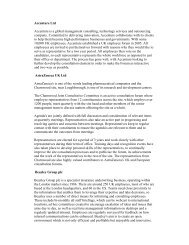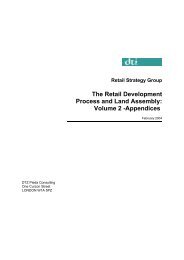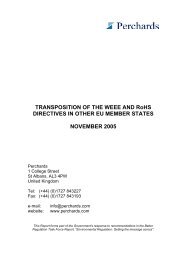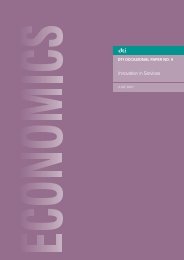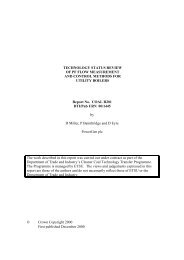Public Policy: Using Market-Based Approaches - Department for ...
Public Policy: Using Market-Based Approaches - Department for ...
Public Policy: Using Market-Based Approaches - Department for ...
Create successful ePaper yourself
Turn your PDF publications into a flip-book with our unique Google optimized e-Paper software.
<strong>Public</strong> <strong>Policy</strong>: <strong>Using</strong> <strong>Market</strong>-<strong>Based</strong> <strong>Approaches</strong><br />
Factors that facilitate collusion<br />
Economists have found that the following market features help firms to reach<br />
and sustain a collusive agreement. 189 These are:<br />
● High concentration: the lower the number of potential firms in a market, the<br />
easier it is to reach an agreement between them;<br />
● Symmetry of firms: it is easier <strong>for</strong> firms to reach an agreement when they are<br />
similar as their interests are more likely to be aligned;<br />
● Transparency: a transparent market makes it easier <strong>for</strong> firms to reach an<br />
agreement and to monitor that the agreement is being maintained;<br />
● Homogenous contracts: if contracts are similar, it is easier <strong>for</strong> firms to share<br />
them amongst themselves;<br />
● Regularity and frequency of orders: if there are frequent, regular orders it is<br />
easier <strong>for</strong> firms to sustain a collusive agreement. It may not be worth<br />
deviating and undermining the agreement <strong>for</strong> a small contract. Moreover,<br />
punishing cheating firms is easier when the next contract comes soon;<br />
● Multi-market contacts: these can help collusion by increasing the symmetry<br />
of firms (as one may be strong in one market, and one strong in another) and<br />
by increasing the regularity of orders. Where firms have a ‘natural territory’<br />
this can also make it easier to agree on an initial allocation of contracts;<br />
● Stable demand: stable demand makes it easier <strong>for</strong> firms to determine<br />
whether prices have fallen due to a firm cheating on an agreement or a<br />
genuine fall in demand;<br />
● High barriers to entry: this makes it less likely that collusion will be<br />
undermined by new entrants; and<br />
● Absence of buyer power: a strong buyer can make collusion more difficult<br />
through the design of the sales process.<br />
Factors that make public procurement vulnerable to collusion<br />
A number of the factors listed above are often found in public procurement<br />
processes, increasing the potential <strong>for</strong> collusion. Although governments should<br />
often be in a position to exercise buyer power, the design of some procurement<br />
processes has on occasions created conditions ideal <strong>for</strong> fostering collusion<br />
among bidders. For example, standard contracts are often awarded by many<br />
local authorities on a local basis, resulting in a high degree of regular, standard<br />
contracts and repeated interaction among firms. In addition, many public tender<br />
processes can require a past track record by a firm, creating barriers to entry and<br />
reducing the pool of potential firms. Risk-averse government agencies, such as<br />
those involved in the provision of frontline services, are likely to favour<br />
procurement through a steady and predictable flow of demand. Stable demand<br />
189 Motta (2004), Competition <strong>Policy</strong>: Theory and Practice, Cambridge University Press.<br />
174




